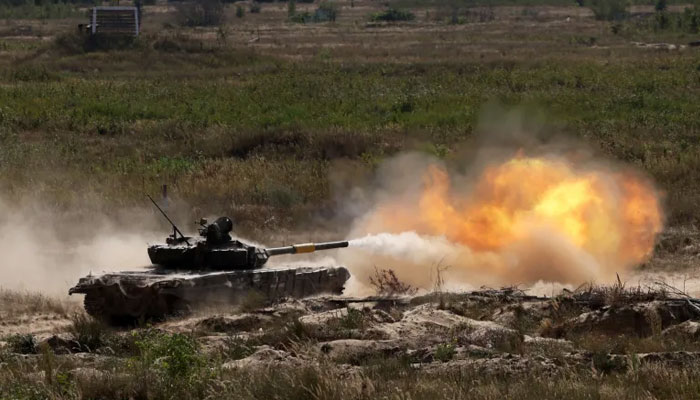Over 100 British companies admit breaching sanctions on Russia
LONDON: More than 100 UK companies have admitted breaching British sanctions against Russia since Moscow’s full-scale invasion of Ukraine last year, official data shows.
A total of 127 companies had voluntarily disclosed sanctions violations to the UK government as of May 17, according to a freedom of information request submitted to HM Treasury and seen by the Financial Times.
By voluntarily admitting breaches and co-operating with investigations, businesses can reduce government penalties. The UK has placed more than 1,600 individuals and companies under sanctions since Russia’s full-scale invasion of Ukraine in February 2022.
In response to the war, the UK has formed its most severe package of sanctions against a major economy, placing a moratorium on UK entities dealing with more than two dozen banks and more than 100 oligarchs.
Stacy Keen, financial crime partner at law firm Pinsent Masons, which made the FOI request, said the sanctions’ breadth had created a big test for British business, given how much more integrated Russia was with the global economy compared with other regimes under sanctions, such as Iran and North Korea.
“The Russian sanction packages have been felt more keenly outside of Russia in a heightened way that others just haven’t in the past,” she said.
“Russian individuals and entities had a footprint outside of Russia that perhaps if you look at the Iranian regime or the Syrian regime — there just wasn’t those interlinks between the economies.”
Business should consider admitting breaches to ensure the greatest leniency, Keen added. Sanctions penalties can range from no action or a warning letter, to a civil penalty or criminal prosecution. Financial penalties have no cap.
HM Treasury’s Office of Financial Sanctions Implementation is responsible for monitoring breaches. A person close to the OFSI said the unit was “not trying to unduly penalise honest mistakes” and takes into account relevant efforts and checks made as potential mitigating factors when assessing a breach.
Issues around a lack of transparency over the ultimate beneficial owners and controllers of companies, as well as Russian shareholders that may sit behind shell companies, can make it harder for UK companies to ensure they have not breached sanctions.
The extent of the links between the UK and Russia across a variety of industries was demonstrated last year when Chelsea Football Club was plunged into crisis after the UK announced sanctions against its owner at the time, the Russian oligarch Roman Abramovich. The move temporarily put the sale of the Premier League team on hold and its sponsorship deals in jeopardy.
Western sanctions have immobilised $300 billion belonging to Russia’s central bank since Russian troops invaded Ukraine.
EU leaders last month endorsed plans to use billions of euros in earnings generated by frozen Russian assets to help Ukraine. The European Commission is expected to put forward legal proposals in early December.
-
 2026 Winter Olympics Men Figure Skating: Malinin Eyes Quadruple Axel, After Banned Backflip
2026 Winter Olympics Men Figure Skating: Malinin Eyes Quadruple Axel, After Banned Backflip -
 Meghan Markle Rallies Behind Brooklyn Beckham Amid Explosive Family Drama
Meghan Markle Rallies Behind Brooklyn Beckham Amid Explosive Family Drama -
 Scientists Find Strange Solar System That Breaks Planet Formation Rules
Scientists Find Strange Solar System That Breaks Planet Formation Rules -
 Backstreet Boys Voice Desire To Headline 2027's Super Bowl Halftime Show
Backstreet Boys Voice Desire To Headline 2027's Super Bowl Halftime Show -
 OpenAI Accuses China’s DeepSeek Of Replicating US Models To Train Its AI
OpenAI Accuses China’s DeepSeek Of Replicating US Models To Train Its AI -
 Woman Calls Press ‘vultures’ Outside Nancy Guthrie’s Home After Tense Standoff
Woman Calls Press ‘vultures’ Outside Nancy Guthrie’s Home After Tense Standoff -
 Allison Holker Gets Engaged To Adam Edmunds After Two Years Of Dating
Allison Holker Gets Engaged To Adam Edmunds After Two Years Of Dating -
 Prince William Prioritises Monarchy’s Future Over Family Ties In Andrew Crisis
Prince William Prioritises Monarchy’s Future Over Family Ties In Andrew Crisis -
 Timothée Chalamet Turns Head On The 'show With Good Lighting'
Timothée Chalamet Turns Head On The 'show With Good Lighting' -
 Bucks Vs Thunder: Nikola Topic Makes NBA Debut As Milwaukee Wins Big
Bucks Vs Thunder: Nikola Topic Makes NBA Debut As Milwaukee Wins Big -
 King Charles Breaks 'never Complain, Never Explain' Rule Over Andrew's £12 Million Problem
King Charles Breaks 'never Complain, Never Explain' Rule Over Andrew's £12 Million Problem -
 Casey Wasserman To Remain LA Olympics Chair Despite Ghislaine Maxwell Ties
Casey Wasserman To Remain LA Olympics Chair Despite Ghislaine Maxwell Ties -
 Shaun White Is Back At The Olympics But Not Competing: Here’s Why
Shaun White Is Back At The Olympics But Not Competing: Here’s Why -
 Breezy Johnson Engaged At Olympics After Emotional Finish Line Proposal
Breezy Johnson Engaged At Olympics After Emotional Finish Line Proposal -
 King Charles Wants Andrew To 'draw A Line' Under Epstein Issue
King Charles Wants Andrew To 'draw A Line' Under Epstein Issue -
 John Wick Game Confirmed With Keanu Reeves And Lionsgate Collaboration
John Wick Game Confirmed With Keanu Reeves And Lionsgate Collaboration




